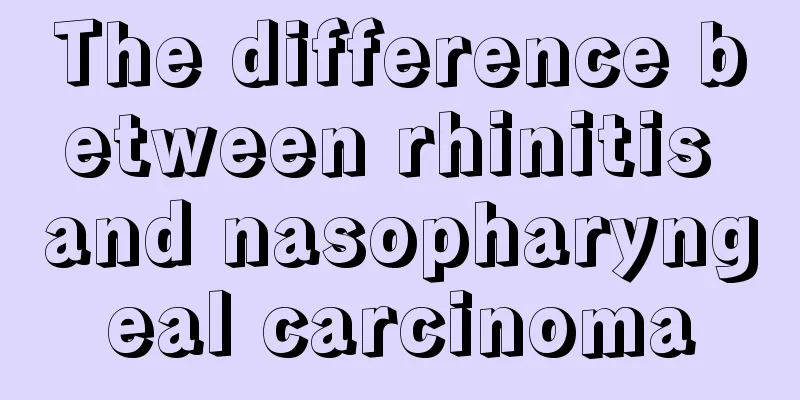The difference between rhinitis and nasopharyngeal carcinoma

|
Nasopharyngeal carcinoma is one of the most common tumors in my country, and ranks first in incidence among head and neck malignant tumors. The age of onset of nasopharyngeal carcinoma is mostly between 40 and 60 years old, and it is more common in men than in women. In the early stages of nasopharyngeal carcinoma, patients generally experience symptoms such as tinnitus, dizziness, and blood in the mucus. Rhinitis is relatively common in life, and patients with long-term and recurrent rhinitis will experience symptoms of nasal congestion and nosebleeds on a daily basis. The two are easily confused, causing some patients to ignore the possibility of nasopharyngeal carcinoma. Experts remind that if early symptoms of nasopharyngeal cancer such as tinnitus, dizziness, and blood in mucus often occur over a period of time, you should go to the hospital for examination and diagnosis as soon as possible. It is important to note that patients with rhinitis should also pay attention to signs of the disease and go to the hospital for nasal endoscopy in time to prevent misdiagnosis or missed diagnosis. Rhinitis patients have a history of frequent colds, and their nasal congestion is alternating, intermittent, and related to body position. When lying on the side, the lower nasal congestion worsens, while the other side is well ventilated. However, nasopharyngeal carcinoma nasal congestion generally starts with one-sided nasal congestion. As the tumor continues to grow, the nasal septum is squeezed to the opposite side and bilateral nasal congestion occurs, which is progressive and continuous. If people over middle age have nose bleeding accompanied by simple nasal congestion, stuffy ears, and foul-smelling nasal discharge, the possibility of malignant tumors should be considered. If there is a family history and symptoms of nasal congestion or nose bleeding persist, you should be highly vigilant. In addition, about 3/4 of nasopharyngeal carcinoma patients have symptoms of bloody nasal discharge, and most of them occur when washing in the early morning, which is a typical early manifestation of nasopharyngeal carcinoma. Nasopharyngeal cancer brings great pain to people. So, how can we effectively prevent nasopharyngeal cancer in daily life? Eat less or no food containing nitrosamines, such as salted meat, salted fish and other pickled vegetables sold in the market. Because they are pickled with coarse salt, they often contain nitrates, which can be reduced to nitrites by Staphylococcus aureus. During the pickling process, part of the protein is decomposed into secondary amines, which react with nitrites to form nitrosamines. These are one of the culprits leading to nasopharyngeal cancer. |
<<: Chemotherapy for nasopharyngeal carcinoma
>>: 5-year survival rate of nasopharyngeal carcinoma
Recommend
Is lung cancer contagious or hereditary? You should know these common knowledge about lung cancer
Will lung cancer patients infect their families? ...
There are a lot of hairs on my face
Sweat hair is a kind of fine hair on the human bo...
Which is better, foundation brush or gourd sponge
Foundation brushes and gourd sponges are both too...
Can dandelions be fried and eaten
In our lives, many people like to eat dandelions,...
What kind of tea can lower blood sugar?
If a friend's blood sugar is slightly high, h...
What medicine should I take for alcohol allergy?
In real life, alcohol is a relatively common liqu...
What is the effect of applying sesame oil on the face
Sesame oil has a fresh and fragrant flavor. It is...
Symptoms of muscle strain, there are these signs
Muscle strain is damage to muscles during strenuo...
Common sense on what to do if your knee ligament is torn
The knee ligaments are very tough and are the key...
How to use a thermometer
Everyone should be familiar with thermometers. We...
Causes and prevention of parasitic skin diseases
Many parasites can cause skin diseases. This skin...
How can I make my period come faster
For women, normal menstruation means that their b...
Can face-slimming injections really make your face slimmer?
Face-slimming injections are a biological agent c...
A collection of cookies without butter
Small cookies are a good choice for afternoon tea...
What are the key points in diagnosing pancreatic cancer
Pancreatic cancer is a disease that makes everyon...









